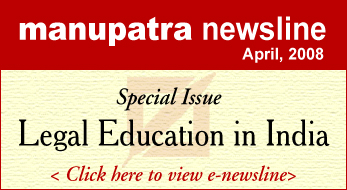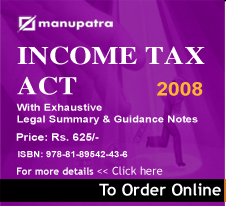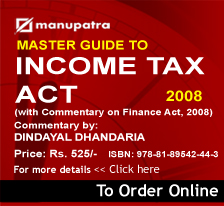|
India Centric Online Legal & Business Database
Bringing forth new efficiency and unparalleled results to research efforts.
| In This Issue |
[No.228] |
April
30, 2008 |
|
|
|
To keep you informed about the latest Legislative and Regulatory information manupatra.com publishes this e-roundup highlighting the recent changes brought about by the Notifications/Acts/Bills /Ordinances etc.
About manupatra.com
http://www.manupatra.com/ provides comprehensive and easy to use legal and related information over the Internet. Our database covers Central Laws, Judgments of Supreme Court and High Court (full text of the judgments from 1950 onwards ), Orders of Tribunals, Bills, Notifications, Circulars and more
Key features of manupatra are
 |
Content is derived from reliable primary and secondary sources |
 |
Database is updated on a daily basis |
 |
Electronic Ready Reckoner to view the judgments under a particular section of an Act / Subject |
 |
Powerful search engine with user friendly interfaces |
 |
Search in any one court/year or multiple courts/year |
 |
Hyper-linking of documents |
 |
Updated modules on WTO, Anti Dumping, Arbitration, Investment Destinations Abroad, Capital Markets, Taxation, Environment, Cyber & IT Laws, IPR, Corporate Laws, Industrial Policies, ForeignTrade, Forex & Banking and more
|
For subscription to manupatra.com or for more details please log onto http://www.manupatra.com/ or call us at 0120 2531811 or send an email to : contact@manupatra.com
If at any stage you wish to stop receiving the e-roundup please click here to unsubscribe.

|

|
 
|
 
|
|
Supreme
Court |
|
In the present case, both MPB (husband) and PDB (wife) executed mutual wills in 1982 on identical terms (1982 Will). MPB by his Will appointed four executors including his wife. MPB died in 1990. In 1999, PDB executed her last Will (1999 Will) bequeathing her entire estate to the first respondent. He was also appointed as the sole executor. She executed a codicil in 2003. Appellants filed caveats to oppose the grant of probate of the 1999 Will. First respondent filed application for grant of probate of 1999 Will before the High Court. Single Judge of High Court allowed the application of discharge of the caveats filed by of appellants. Appeals were filed before the Division Bench of the High Court. Cross-objections were filed by First respondent. The Division Bench of the High Court dismissed the appeals as also the cross-objections. Hence, the present appeal. Held, a Caveatable interest would mean an interest in the estate of the deceased to which the Caveator would otherwise be entitled to, subject of course, of having a special interest therein. When a person who would have otherwise succeeded to the estate of the testator, would ordinarily have a Caveatable interest, any other person must ordinarily show a special interest in the estate. Rules can also be framed by the High Court in exercise of its supervisory jurisdiction under Article 227, Constitution. A caveat would be maintainable even at the instance of a person who had been able to establish "some sort of relationship" and howsoever distant he may be from the deceased which per se cannot have any application after coming into force of the Hindu Succession Act. If anybody and everybody including a busy body or an interloper is found to be entitled to enter a caveat and oppose, grant of a probate, then Sections 283(1)(c) and 284 of the 1925 Act would have been differently worded. Such an interpretation would lead to an anomalous situation. Existence of a mutual Will or filing of a suit, by themselves, are not sufficient to create a Caveatable interest. Appellants have disentitled themselves from lodging a Caveat as they were questioning the title of the testatrix as also her right to execute a Will as it had been contended that she merely had a life interest and no right of dispossession of property by Will or otherwise. Appellants being merely executors, would not clothe them with a right to lodge a Caveat as by reason thereof they did not derive any Caveatable interest in the estate of wife. Directions issued. Appeals disposed of.
The present appeals filed by various owners of sugar mills who purchased sugarcane from the farmers, concerns with the determination of price of sugar for the sugar years 1983-84 and 1984-85. However, the Central Government continued with the exercise of determination of the price of levy sugar on the basis of 100 per cent mopping up and had not been considering the changed scenario. The State of Uttar Pradesh under Section 16, UP Sugarcane (Regulation of Supply and Purchase) Act, 1953 enforced a price to be paid by the owners of the sugar mill to the producers known as State Advisory Price (ASP). Writ applications were filed questioning the mode of calculation resorted to by the Central Government in determining the price of levy sugar. Divergent views were taken by Division Benches of the High Court. Hence, present appeal. Held, direction by the Central Government to the owners of the sugar mills that a part of their products would be sold at a price determined by it is within its power under Section 3(2)(f) of the Act. Determination of price in terms of the provisions of the Act is a legislative function. However, if a price is determined without applying the principles underlying the factors enunciated in Section 3(3C) of the Act, the superior Courts can issue requisite direction. In the present case, the relevant factor that the Central Government has to take into consideration was Sub-Clause (iv) of Clause 5A of the Order which mandates that the additional price determination under Sub-Clause (ii) shall be paid by the producer of sugar to the sugarcane grower. If the actual price payable to the cane growers is absolutely relevant for determining the price of levy of sugar, then the effect of payment of an extra amount in terms of State Advisory Price cannot be refused to be taken into consideration. These elements would come either under Clause (b) or Clause (d) of Section 3(3C) of the Act. 100 per cent mopping held to be illegal. Direction to Central Government to re-fix the price of levy sugar while taking into consideration all the relevant factors. Appeal disposed of.
|
High Courts |
|
Bombay
Wife filed maintenance proceedings against husband and the same was disposed of in terms of compromise between the parties whereby husband agreed to pay maintenance of Rs. 5000 per month in case he declined/refused to maintain her after the settlement. The terms of the compromise where not incorporated in the final Order. Thereafter the wife filed application under section 128 of Cr.P.C. for enforcement of term of agreement and the Trial Court issued recovery warrant against the husband. Hence present petition by husband challenging the impugned order of the Trial court. If a conditional Order which allows maintenance on fulfillment of certain conditions is passed then such Order is not executable unless and until such precondition is fulfilled and is outside the pale of Section 128 of Cr.P.C
Plaintiff-respondent filed suit for possession of suit property on ground that Defendant-applicants had forcibly taken possession of suit property, which was occupied by Plaintiff's tenant. Trial Court came to the conclusion that the Plaintiff is the owner of suit premises and passed a decree in favour of Plaintiff. Hence, the present revision application. Defendant-applicant contended that if the tenant was dispossessed from the suit property it was the tenant who had to file the suit for possession and not the landlord.
The language of Section 9 of the Specific Relief Act, 1877 and the language of Sub-section (1) of Section 6 of the Specific Relief Act, 1963 are similar. Section 6(1) and also the earlier Section 9 clearly provided that if any person is dispossessed without his consent of immovable property otherwise than in due course of law, he or any person claiming through him may recover the possession by filing a suit. In view of the language, either
P.V. Varik, the tenant, who was actually dispossessed or his landlady i.e. the present Plaintiff, could file the suit. In view of the language of Section as well as the clear Division Bench authority of this High Court, referred above, it must be held that suit filed by the Plaintiff under Section 6 is tenable..
|
RBI |
|
DBOD
DBOD.No.Leg.BC.75 /09.07.005/2007-08
Dated 24.04.2008 : Reserve Bank has issued revised and the final guidelines regarding the policy, practice, and procedure involved in the engagement of recovery agents by banks in India. Banks are advised to take into account certain specific considerations while engaging recovery agents, methods to be followed by the recovery agents while Taking possession of property mortgaged / hypothecated to banks and other related areas.
(a) Engagement of Recovery Agents
Banks are advised to have a due diligence process in place for engagement of recovery agents, which should be so structured to cover, among others, individuals involved in the recovery process. Further, banks are required to ensure that the agents engaged by them in the recovery process carry out verification of the antecedents of their employees, which may include pre-employment police verification, as a matter of abundant caution. At the same time banks are supposed to ensure due notice and appropriate authorization, banks should inform the borrower the details of recovery agency firms / companies while forwarding default cases to the recovery agency and notice , authorization letter should, among other details, also include the telephone numbers of the relevant recovery agency. Banks should ensure that there is a tape recording of the content / text of the calls made by recovery agents to the customers, and vice-versa. Details of the recovery agency firms / companies engaged by banks may also be posted on the bank's website.
(b) Methods followed by Recovery Agents
Banks are advised to strictly adhere to the guidelines / code provided by different circulars during the loan recovery process
(c) Training for Recovery Agents
Banks are advised that they should ensure that, the recovery agents are properly trained to handle with care and sensitivity, their responsibilities, in particular aspects like hours of calling, privacy of customer information etc, as provided by the guidelines on managing risks and code of conduct in outsourcing of financial services by banks.
(d) Taking possession of property mortgaged / hypothecated to banks
Banks are advised that they rely only on legal remedies available under the relevant statutes while enforcing security interest without
intervention of the Courts.
(e) Complaints against the bank / its recovery agents
Banks, as principals, are responsible for the actions of their agents. Therefore, they are required to ensure that their agents engaged for recovery of their dues should strictly adhere to the above guidelines and instructions, including the BCSBI Code, while engaged in the process of recovery of dues. Complaints received by Reserve Bank regarding violation of the guidelines mentioned above and adoption of abusive practices followed by banks' recovery agents would be viewed seriously. Reserve Bank may think about imposing a ban on a bank from engaging recovery agents in a particular area, either jurisdictional or functional, for a limited period. In case of unrelenting breach of above guidelines, Reserve Bank may consider extending the period of ban or the area of ban.
Press
Release
- RBI Invites Public Comments on Draft Regulations on Payment and Settlement Systems
Press Release No. : PR No 1378 Dated 25042008 :
Reserve Bank of India has placed on its website draft regulations titled as" Board for Regulation and Supervision of Payment and Settlement Systems Regulations, 2008 "framed under the Payment and Settlement Systems Act 2007 for public comments. Comments can be sent to the Chief General Manager, Department of Payment and Settlement Systems, Reserve Bank of India, Central Office, Shaheed Bhagat Singh Marg, Mumbai (fax number: 022- 22659566) or may be e-mailed latest by May 15, 2008.
The Payment and Settlement Systems Bill was passed by Parliament and became an Act known as the Payment and Settlement Systems Act 2007 after receiving the assent of the Hon'ble President on December 20, 2007.
The Act confers powers on the Reserve Bank of India to regulate and supervise the payment and settlement systems in the country, gives it authority to permit the setting up /continuance of such systems, call for information/data and issue directions from/ to payment system providers. It also defines a payment system as well as gives legal recognition to multilateral netting and settlement finality. The Reserve Bank is empowered under the Act to make regulations to implement the provisions of the Act.
|
SEBI |
SMD
MRD/DSA/SE/ Cir-09/2008
Dated 17.04.2008 : SEBI clarifies that the term "shareholder having trading rights" mentioned in shareholder having trading rights" under Securities Contracts (Regulation) (Manner of Increasing and Maintaining Public Shareholding in Recognised Stock Exchanges) Regulations, 2006 would mean "a shareholder who has a trading interest in the stock exchange, whether directly or indirectly through a person having trading rights".
Explanation: A shareholder having a trading interest "indirectly" in relation to a person having trading rights, would be understood in the same manner as the term "associate" is in relation to a shareholder having trading rights under regulation 2(1)(b) of the Securities Contracts (Regulation) (Manner of Increasing and Maintaining Public Shareholding in Recognised Stock Exchanges) Regulations, 2006
This clarification is issued by the SEBI to ensure that at least fifty-one percent of equity share capital of recognised stock exchange is held by the public.
|
| International Legal Cases and News |
|
Cases
This case is filed asserting that the
Commonwealth's lethal injection protocol violates the Eighth Amendment's ban on
"cruel and unusual punishments." Where the petitioner has convicted
murders and is sentenced to death in Kentucky state court. The state trial court
held extensive hearings and entered detailed fact findings and conclusions of
law, ruling that there was minimal risk of various of petitioners' claims of
improper administration of the protocol, and upholding it as constitutional. The
Kentucky Supreme Court affirmed, holding that the protocol does not violate the
Eighth Amendment because it does not create a substantial risk of wanton and
unnecessary infliction of pain, torture, or lingering death.
Petitioner Burgess pleaded guilty in federal
court to conspiracy to possess with intent to distribute cocaine base. Burgess
had a prior South Carolina cocaine possession conviction, which carried a
maximum sentence of two years but was classified as a misdemeanor under state
law. The Federal Government argued that Burgess' minimum federal sentence should
be enhanced to 20 years under §841(b)(1)(A) because his South Carolina
conviction was punishable by more than one year's imprisonment. Burgess
countered that because "felony drug offense" incorporates the term
"felony," a word separately defined in §802(13), a prior drug offense
does not warrant an enhanced §841(b)(1)(A) sentence unless it is both (1)
classified as a felony under the law of the punishing jurisdiction, per
§802(13); and (2) punishable by more than one year's imprisonment, per
§802(44). Rejecting that argument, the District Court ruled that §802(44)
alone controls the meaning of "felony drug offense" under
§841(b)(1)(A). The Fourth Circuit affirmed. Held, because the term "felony
drug offense" in §841(b)(1)(A) is defined exclusively by §802(44) and
does not incorporate §802(13)'s definition of "felony," a state drug
offense punishable by more than one year qualifies as a "felony drug
offense," even if state law classifies the offense as a misdemeanor.
Judgment of the Court of Appeals for the Fourth Circuit is affirmed.
News
The vital evidence for the innocence of accused
Indian doctor Mohamed Haneef, has been claimed to unknown to former Australian
immigration minister Kevin Andrews. He said that was the main reason for
canceling Haneef's visa last year, as the Australian Federal Police did not
inform him of evidence debunking allegations against Dr Haneef's second-cousin
Sabeel Ahmed - allegations that had led to the subsequent terrorism charge
against the Gold Coast doctor. The inquiry will open on Wednesday with a
directions hearing in Canberra that is expected to hear submissions from
Haneef's lawyers calling on Attorney-General Robert McClelland to grant Clarke
inquiry powers to ensure documents are released and witnesses compelled to give
evidence and face cross-examination.
For the result of Lhasa violence that resulted
in the death of several people during the mid-March riots the China government
has sentenced 6 monks and 24 others to jail sentences ranging from three years
to lifetime. Only three people got life imprisonment, out of which one is a
monk. Two other monks got 20 years in jail while three other monks were sent to
prison for 15 years. This is the first court verdict on the Lhasa riots and many
more people are expected to be punished. According to the sources, the court
apparently took its decision in about three to four weeks time as most of the
arrests were made from March end onwards.
|
|
Disclaimer |
|
(1) While all reasonable care has been taken to ensure that the information provided in the "round up" and on the website is fair and accurate the company and its promoters and employees shall not in any way be responsible for the consequences of any action taken on the basis of reliance upon the contents of this "round up". |
|
(2) This is not a Spam mail. You have received this mail because you have either requested for it or someone must have suggested your name under our various referral programs. Since India has no anti-spamming law, we refer to the US directive, which states that a mail cannot be considered Spam if it contains the sender's contact information, which this mail does. In case this mail doesn't concern you, please unsubscribe from mailing list.
 Feedback Feedback
|
|
![]()





